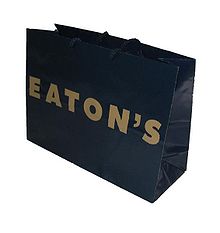Shopping bag: Difference between revisions
Appearance
Content deleted Content added
Remove links per policy |
Revert to undamaged version |
||
| Line 3: | Line 3: | ||
'''Shopping bags''' are medium sized bags, typically around 10-20 [[litre]]s (2.5 to 5 gallons) in [[volume]] (though much larger versions exist, especially for non-grocery shopping), that are often used by [[grocery]] [[shopper]]s to carry home their purchases. They can be single-use (disposable), used for other purposes (storage, can liners, etc) or designed as [[reusable shopping bag]]s. |
'''Shopping bags''' are medium sized bags, typically around 10-20 [[litre]]s (2.5 to 5 gallons) in [[volume]] (though much larger versions exist, especially for non-grocery shopping), that are often used by [[grocery]] [[shopper]]s to carry home their purchases. They can be single-use (disposable), used for other purposes (storage, can liners, etc) or designed as [[reusable shopping bag]]s. |
||
==Types== |
|||
Shopping bags were invented in 1912 by Walter H. Deubner, a grocer in [[St. Paul, Minnesota]]. |
|||
Types and typical use of shopping bags vary by country: |
|||
* In many [[Europe]]an countries, plastic shopping bags are free and common into the 21st century, but their use is becoming less widespread, partly due to [[environmental legislation]], which has led retailers to charge for single use [[plastic shopping bag]]s{{Citation needed|date=May 2011}}. [[Republic of Ireland|Ireland]] for example imposed a dedicated plastic bag [[tax]], thus forcing retailers offering plastic bags to charge for them.<ref>{{cite news| url=http://news.bbc.co.uk/2/hi/europe/2205419.stm | work=BBC News | title=Irish bag tax hailed success | date=2002-08-20 | accessdate=2010-05-23}}</ref> |
|||
* [[Reusable shopping bag]]s are increasingly used, eg. in [[EU]] countries where use of single-use plastic shopping bags is in decline. [[Reusable bag]]s are often made from [[jute]] cloth, also known as [[burlap]] in the US, but sometimes they are also made from plastic; however these reusable plastic bags are sturdier than single-use plastic shopping bags. In the USA, reusable bags are used as a fashion statement or for advertising.<ref>{{cite news |url=http://www.nytimes.com/2007/12/16/business/16bags.html?_r=1&oref=slogin |title= Never Mind Whats In Them, the Bags are Fashion |accessdate=2007-12-16 |last= Barbaro|date= December 16, 2007 |publisher=New York Times }}</ref> |
|||
* In the [[United States]] and [[Canada]], single-use [[plastic shopping bag]]s are common and often free with a purchase. Some retailers, such as department stores, are more likely to provide paper bags to shoppers, whereas [[supermarket]]s and [[grocery store]]s tend to favour [[plastic shopping bag]]s. People are encouraged to have reusable shopping bags, when possible. |
|||
:In an effort to reduce plastic bag use, the city of [[Toronto]] requires retailers to charge a minimum {{CAD|0.05}} fee for each plastic bag; prompted by the plastic bag charge in Toronto, many national retailers have imposed similar fees on plastic bags in their outlets in other parts of [[Canada]]. All of the profits derived from the $0.05 fee go directly to the retailer.<ref>{{cite web | title=Toronto's new plastic retail shopping bag bylaw now in effect | url=http://wx.toronto.ca/inter/it/newsrel.nsf/bydate/B189C7961D38AD96852575C9004E8B3C | work= | publisher=City of Toronto | date=2009-06-01 | accessdate=2009-06-09}}</ref><ref>{{cite web | title=Retailers can keep fees for plastic bags | url=http://www.nationalpost.com/news/canada/toronto/story.html?id=1652847 | work=[[National Post]] | publisher= | date=2009-06-02 | accessdate=2009-06-09}}</ref> |
|||
==Environmental concerns== |
==Environmental concerns== |
||
Revision as of 08:03, 29 March 2012

Shopping bags are medium sized bags, typically around 10-20 litres (2.5 to 5 gallons) in volume (though much larger versions exist, especially for non-grocery shopping), that are often used by grocery shoppers to carry home their purchases. They can be single-use (disposable), used for other purposes (storage, can liners, etc) or designed as reusable shopping bags.
Types
Types and typical use of shopping bags vary by country:
- In many European countries, plastic shopping bags are free and common into the 21st century, but their use is becoming less widespread, partly due to environmental legislation, which has led retailers to charge for single use plastic shopping bags[citation needed]. Ireland for example imposed a dedicated plastic bag tax, thus forcing retailers offering plastic bags to charge for them.[1]
- Reusable shopping bags are increasingly used, eg. in EU countries where use of single-use plastic shopping bags is in decline. Reusable bags are often made from jute cloth, also known as burlap in the US, but sometimes they are also made from plastic; however these reusable plastic bags are sturdier than single-use plastic shopping bags. In the USA, reusable bags are used as a fashion statement or for advertising.[2]
- In the United States and Canada, single-use plastic shopping bags are common and often free with a purchase. Some retailers, such as department stores, are more likely to provide paper bags to shoppers, whereas supermarkets and grocery stores tend to favour plastic shopping bags. People are encouraged to have reusable shopping bags, when possible.
- In an effort to reduce plastic bag use, the city of Toronto requires retailers to charge a minimum CA$0.05 fee for each plastic bag; prompted by the plastic bag charge in Toronto, many national retailers have imposed similar fees on plastic bags in their outlets in other parts of Canada. All of the profits derived from the $0.05 fee go directly to the retailer.[3][4]
Environmental concerns
Heavy duty multiple-use shopping bags are often considered environmentally better than single-use paper bags or plastic shopping bags.
See also
References
- ^ "Irish bag tax hailed success". BBC News. 2002-08-20. Retrieved 2010-05-23.
- ^ Barbaro (December 16, 2007). "Never Mind Whats In Them, the Bags are Fashion". New York Times. Retrieved 2007-12-16.
- ^ "Toronto's new plastic retail shopping bag bylaw now in effect". City of Toronto. 2009-06-01. Retrieved 2009-06-09.
- ^ "Retailers can keep fees for plastic bags". National Post. 2009-06-02. Retrieved 2009-06-09.
